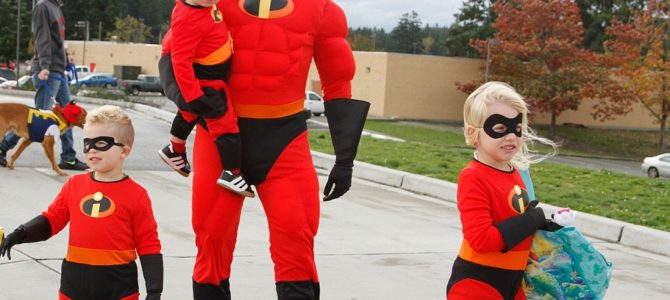
This weekend, “The Incredibles 2” hits theaters, 14 years after the original. In an age of franchises, reboots, and endless recycling of profitable stories, such a long period between movies indicates this was a special story. Indeed, among Disney/Pixar stories, it’s unique. It’s a story written by adults for adults—about men and women, husbands and wives, parents and children. This is about American freedom. Don’t let animation fool you, this is not “Frozen”—it’s “Watchmen.”
Before you go see the new movie, let’s talk about the original, or how we got here. “The Incredibles” was a story about post-war America and how we went from heroism to a depressive view of life. We first see the exuberance of freedom—crime-fighting heroes (and the villains, too) who amaze and protect people. This is how we felt about the men who came back from World War II. This is how we felt about Chuck Yeager when he broke the sound barrier and later the Mercury Seven flying into orbit.
Then normal life kicks in and heroes’ freedom becomes a problem. For a while, we see policemen expecting more and more of the heroes and we begin to suspect that freedom in this sense means simply irresponsibility. Somebody else will deal with our problems for us.
The Promise and Perils of Freedom
But then things get worse. A crazy guy sues Mr. Incredible for saving him when he leapt to his death! Does freedom include the freedom to commit suicide? Do we not think life is good and try to avoid death? How can heroes orient themselves if freedom makes society morally incoherent?
Freedom certainly includes the freedom to sue, and we are an amazingly litigious society. Freedom means each and every one of us has certain expectations and, when they are not fulfilled, we look for someone to blame. Being a hero becomes being a scapegoat. Remember “The Buck Stops Here”? We pass the buck—but eventually someone’s stuck with it.
At this point in the movie, the heroes become fully private men and women, no longer able to act publicly on our behalf, because all we want is someone to blame. So this is more than a children’s movie. We have met the enemy, and it is us. This is one way freedom can become crazy: when it transforms from a national effort to a personal quality.
The movie shows us this craziness in two other ways, too. First, our growing sense of entitlement means we abandon ourselves to massive bureaucracies. Indeed, mid-century America was all about Big. Big Government was incredibly popular, on the way to massive majorities voting enthusiastically for the Great Society, which turned out to be far from great.
Big Labor was popular, too, and that ended up with the economic crisis of the 1970s. Corporations had to be as Big (remember The Big Three), hiring tens or hundreds of thousands of people. Management would be the way to the future. That meant each one of us individually became utterly replaceable.
This is why Mr. Incredible has to squeeze into a small cubicle and small car and a small life as an insurance claims adjuster, and be bullied by a boss who doesn’t even care about the customers. We want insurance. We want to control the future for purposes of security and peace of mind.
The Freedom to Abuse Others
Secondly, our discovery of freedom as a personal quality doesn’t just lead us to embrace massive organizations that take care of our claims, it also makes us want power. This is how the villain of the story is created. He starts out as IncrediBoy and ends up as the nefarious Syndrome. Science and technology give him the powers that nature gave to Mr. Incredible.
Nature is unfair. It is cosmically unjust for some to be brilliant and others obscure. Power can be used to level the playing field, making each one the equal of any other, by force if necessary. It is the claim of equality, implicit in freedom, that creates this new evil.
This kid, you see, is not satisfied to admire the hero. He wants to be the hero. If that’s not possible, he’ll make it happen, even if he has to endanger our lives so he can save us. We can recognize this kind of terrifying ambition in our own politics.
Think about college hysterias, which come from our moralism as a society. If we didn’t tell kids college is the way to the future and they should lead, impress, attract attention, and have people near-worship them, they wouldn’t pull as many stunts to get attention. Whatever harm they inflict to institutions of higher education is simply necessary for them to then heroically save the day.
The aspect of heroes as celebrities leads to the catastrophe in “The Incredibles.” It’s about our world now, where we make celebrities of children. They see celebrities and wonder, why can’t they be that? Well, now with digital technology, they can. We don’t have to make it in Hollywood. We could be Twitter-famous or Instagram-famous or a celebrity on YouTube. Why should other people, who are just like you, get more attention? Obviously, this drives a lot of kids to do stupid things and, what’s worse, it corrupts their hearts.
This is also why the humiliation of Mr. Incredible as a boring claims adjuster living in a boring suburbia is a necessary humbling. The story is supposed to teach him and us that family is the beginning of the solution to the problem of celebrity that creates villains and scientific powers that threaten our lives. Family is the ground on which achievement is built, and it must be protected—or else individualism, the excess of freedom and equality wrongly understood, can ruin society.
Our heroes and our successes have created a super-artificial world. We need some awareness of nature in order to remain good.









